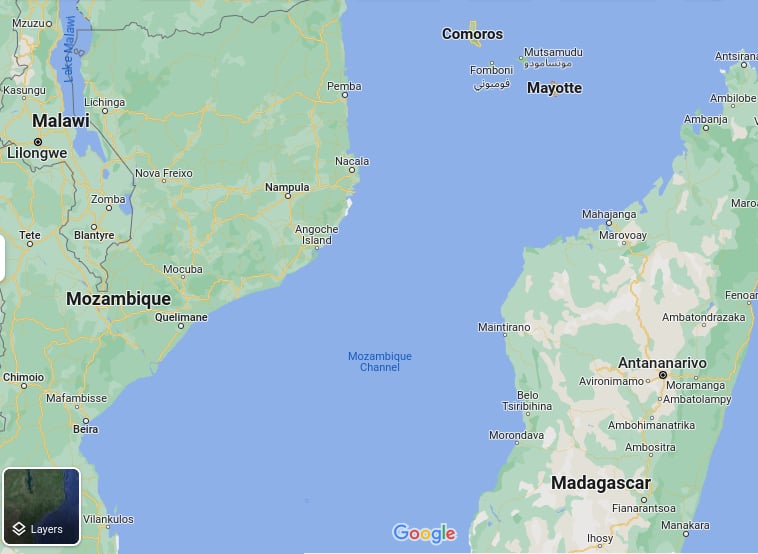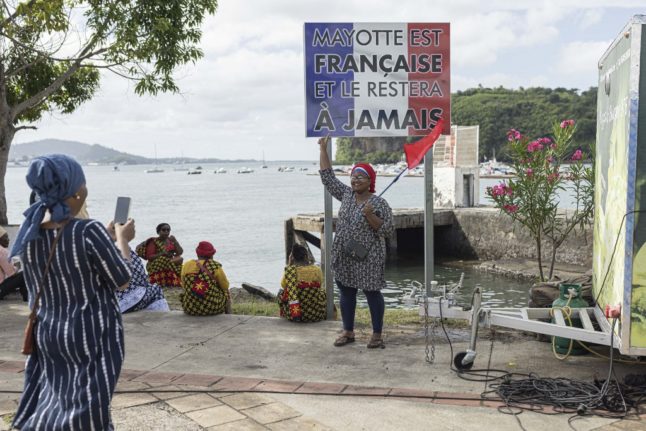More than 1,800 police officers and gendarmes have been mobilised by France’s interior ministry, headed by Minister Gérald Darmanin, in an operation against illegal immigration – but this time they were sent to Mayotte, a small island in the Indian Ocean.
Operation Wuambushu has stirred controversy both on the island of Mayotte and mainland France – over 7,000 kilometres away.
[DIRECT] Beaucoup de monde place de la République à Paris pour la manifestation nationale appelée par les collectifs de sans-papiers, la @MSolidarites et @Ucij2023, contre la loi immigration et l'opération militaro-policière Wuambushu à Mayotte menée par Darmanin. pic.twitter.com/uJZSndV8j0
— Révolution Permanente (@RevPermanente) April 29, 2023
On Saturday, hundreds gathered across France to protest over Operation Wuambushu.
What is Wuambushu?
Wuambushu – which means ‘take back’ in the local language – is an immigration crackdown.
Its goal is to expel thousands of illegal immigrants who live in shantytowns on Mayotte and deport them to Anjouan, the nearest Comorian island about 70km. However, authorities in Anjouan over the weekend refused to accept a ship carrying 60 people.
The French police operation is backed by some local leaders on Mayotte, who claim that the shantytowns are unhealthy and the new arrivals have led to an increase in crime.
Authorities have also begun demolishing the shantytowns – some of which have been there for years or even decades.
But the situation has really come about because of the unique political situation on the island of Mayotte.

Tell me about Mayotte
Part of a volcanic archipelago called Comoros between Madagascar and Africa, Mayotte is composed of two islands – Grande-Terre and Petite-Terre – as well as about thirty small islets.
The archipelago was gradually populated by people from the African continent and Madagascar. During the Middle Ages, Arabs began to come to the island, bringing along the Islamic religion and eventually establishing a sultanate. In 1841, the Sultan of Mayotte sold it France and shortly after it became a French colony.
In 1886 a French protectorate was established on the three other islands of the Comoros: Grande Comore, Mohéli and Anjouan. They too became French colonies in 1912, almost 70 years after Mayotte.
All of the islands went on to become French overseas territories from 1946 to 1975.
However, the relationship between the islands and France differed, particularly after World War II when the “Mouvement populaire mahorais” (MPM) was created in Mayotte, which pushed for a closer relationship with France. In contrast, independence movements grew throughout the rest of Comoros.
In 1974, an independence referendum was held, and the other three islands chose to become independent from France, but the majority of people in Mayotte voted to remain part of the French Republic.
In 1975, Comoros declared its independence – and included Mayotte as part of Comoros.
In response, France organised a second referendum the year later for residents in Mayotte to decide if they wanted to stay a part of France or join Comoros. Mayotte voted overwhelmingly (over 99 percent) to remain in France, but Comoros did not accept the results, continuing to classify Mayotte as part of the country.
“This event was a legal coup,” Claude-Valentin Marie, an expert at the French National Institute of Demographic Studies, told Le Monde. Afterwards, France was condemned by the United Nations for failing to respect Comorian sovereignty over Mayotte.
Independence
The difference in status between Mayotte and the rest of the Comores created complications in travel between the islands, and also a difference in wealth.
Mayotte is one of the poorest parts of France, with living standards and wages far below the average in mainland France – however compared to its neighbouring islands it is wealthy.
As Mayotte grew wealthier and was viewed as more stable than the rest of Comoros, migration from neighbouring islands increased.
“If we summarise, the more the Comorian cousins arrived, the more the Mahorans asked for institutional protection from the French authorities,” Marie told Le Monde.
In 1995, France created a new, stricter visa procedure for people from Comoros to come to Mayotte. This led to a rise in illegal and undocumented crossings.
Mayotte drew even closer to France in 2011 when it became a département – an administrative region that puts the island – theoretically – on an equal status with mainland French départements such as Dordogne or Paris.
France’s membership of the EU also had consequences for the island – in 2014 it became an “EU ultra-peripheral region (UPR)” – and is now an external border of the EU.
The situation now
Despite being a French département, nearly half of the 270,000 population in Mayotte does not have French nationality, even though around a third of the non-French nationals were born on the island.
Of the non-French nationals, nearly 90 percent come from the other islands of the Comores, making increasingly dangerous crossings to evade the strict French visa rules – in 2022 more than 25,000 people were deported.
And it is this migration situation that makes Mayotte a ‘French exception’ – despite theoretically having the same status as other French départements, laws around citizenship, immigration and asylum are different on the island to the rest of France.
For example, in France, if a child is born to foreign parents, they can obtain French nationality when they turn 18 if they have lived in France for at least five years since turning 11.
In Mayotte, one of the parents must also have been legally on French territory for at least three months at the time of birth – this is a period that Interior Minister Gérald Darmanin, has repeatedly stated that he wants to increase.
Another example is residency – elsewhere in France, when a foreigner obtains a residence permit, they can move anywhere within French territory. In Mayotte, the permit is only valid in the archipelago – which means that person cannot come to mainland France.
The island also has stricter asylum criteria than the rest of France.
Operation Wuambushu – and the reaction from neighbouring islands – have brought to a head all these long-simmering tensions, and turned an international spotlight on the odd situation of the French overseas territory.



 Please whitelist us to continue reading.
Please whitelist us to continue reading.
Member comments